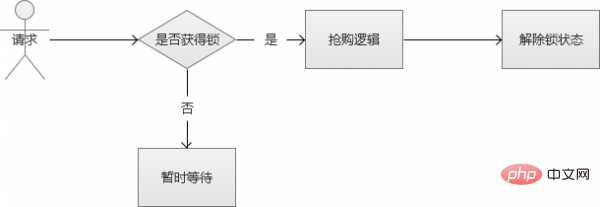How does php solve high concurrency?

PHP solves high concurrency problems
We know that when multiple threads write to the same file, there will be "thread safety" Question (Multiple threads run the same piece of code at the same time. If the result of each run is the same as that of a single-thread run, and the result is the same as expected, it is thread-safe). If it is a MySQL database, you can use its own lock mechanism to solve the problem. However, in large-scale concurrency scenarios, MySQL is not recommended.
In flash sales and rush sales scenarios, there is another problem, which is "over-sending". If this aspect is not controlled carefully, excessive sending will occur. We have also heard that some e-commerce companies conduct rush buying activities. After the buyer successfully purchases the product, the merchant does not recognize the order as valid and refuses to deliver the goods. The problem here may not necessarily be that the merchant is treacherous, but that it is caused by the risk of over-issuance at the technical level of the system.
1, Pessimistic lock ideas
There are many ideas to solve thread safety, and the discussion can start from the direction of "pessimistic lock".
Pessimistic lock, that is, when modifying data, the lock state is adopted to exclude modifications from external requests. When encountering a locked state, you must wait.

Although the above solution does solve the problem of thread safety, don't forget that our scenario is "high concurrency". In other words, there will be many such modification requests, and each request needs to wait for a "lock". Some threads may never have a chance to grab this "lock", and such requests will die there.
At the same time, there will be many such requests, which will instantly increase the average response time of the system. As a result, the number of available connections will be exhausted and the system will fall into an exception.
2. FIFO queue idea
Okay, then let’s slightly modify the above scenario. We directly put the request into the queue, using FIFO (First Input First Output, first in, first out), in this case, we will not cause some requests to never obtain the lock. Seeing this, does it feel like forcibly turning multi-threading into single-threading?

Then, we have now solved the lock problem, and all requests are processed in a "first in, first out" queue. Then a new problem comes. In a high-concurrency scenario, because there are many requests, the queue memory may be "exploded" in an instant, and then the system will fall into an abnormal state.
Or designing a huge memory queue is also a solution. However, the speed at which the system processes requests in a queue cannot be compared with the number of crazy influxes into the queue. In other words, more and more requests will accumulate in the queue. Eventually, the average response time of the Web system will still drop significantly, and the system will still fall into an exception.
3. The idea of file lock
For applications where the daily IP is not high or the number of concurrency is not very large, generally there is no need to consider these! There is no problem at all with normal file manipulation methods. But if the concurrency is high, when we read and write files, it is very likely that multiple processes will operate on the next file. If the access to the file is not exclusive at this time, it will easily cause data loss
Optimization plan 4: Use non-blocking file exclusive lock
<?php
//优化方案4:使用非阻塞的文件排他锁
include ('./mysql.php');
//生成唯一订单号
function build_order_no(){
return date('ymd').substr(implode(NULL, array_map('ord', str_split(substr(uniqid(), 7, 13), 1))), 0, 8);
}
//记录日志
function insertLog($event,$type=0){
global $conn;
$sql="insert into ih_log(event,type)
values('$event','$type')";
mysqli_query($conn,$sql);
}
$fp = fopen("lock.txt", "w+");
if(!flock($fp,LOCK_EX | LOCK_NB)){
echo "系统繁忙,请稍后再试";
return;
}
//下单
$sql="select number from ih_store where goods_id='$goods_id' and sku_id='$sku_id'";
$rs = mysqli_query($conn,$sql);
$row = $rs->fetch_assoc();
if($row['number']>0){//库存是否大于0
//模拟下单操作
$order_sn=build_order_no();
$sql="insert into ih_order(order_sn,user_id,goods_id,sku_id,price)
values('$order_sn','$user_id','$goods_id','$sku_id','$price')";
$order_rs = mysqli_query($conn,$sql);
//库存减少
$sql="update ih_store set number=number-{$number} where sku_id='$sku_id'";
$store_rs = mysqli_query($conn,$sql);
if($store_rs){
echo '库存减少成功';
insertLog('库存减少成功');
flock($fp,LOCK_UN);//释放锁
}else{
echo '库存减少失败';
insertLog('库存减少失败');
}
}else{
echo '库存不够';
insertLog('库存不够');
}
fclose($fp);
?>The above content is for reference only!
Recommended tutorial: PHP video tutorial
The above is the detailed content of How does php solve high concurrency?. For more information, please follow other related articles on the PHP Chinese website!

Hot AI Tools

Undresser.AI Undress
AI-powered app for creating realistic nude photos

AI Clothes Remover
Online AI tool for removing clothes from photos.

Undress AI Tool
Undress images for free

Clothoff.io
AI clothes remover

Video Face Swap
Swap faces in any video effortlessly with our completely free AI face swap tool!

Hot Article

Hot Tools

Notepad++7.3.1
Easy-to-use and free code editor

SublimeText3 Chinese version
Chinese version, very easy to use

Zend Studio 13.0.1
Powerful PHP integrated development environment

Dreamweaver CS6
Visual web development tools

SublimeText3 Mac version
God-level code editing software (SublimeText3)

Hot Topics
 1666
1666
 14
14
 1425
1425
 52
52
 1327
1327
 25
25
 1273
1273
 29
29
 1252
1252
 24
24
 PHP and Python: Comparing Two Popular Programming Languages
Apr 14, 2025 am 12:13 AM
PHP and Python: Comparing Two Popular Programming Languages
Apr 14, 2025 am 12:13 AM
PHP and Python each have their own advantages, and choose according to project requirements. 1.PHP is suitable for web development, especially for rapid development and maintenance of websites. 2. Python is suitable for data science, machine learning and artificial intelligence, with concise syntax and suitable for beginners.
 PHP: A Key Language for Web Development
Apr 13, 2025 am 12:08 AM
PHP: A Key Language for Web Development
Apr 13, 2025 am 12:08 AM
PHP is a scripting language widely used on the server side, especially suitable for web development. 1.PHP can embed HTML, process HTTP requests and responses, and supports a variety of databases. 2.PHP is used to generate dynamic web content, process form data, access databases, etc., with strong community support and open source resources. 3. PHP is an interpreted language, and the execution process includes lexical analysis, grammatical analysis, compilation and execution. 4.PHP can be combined with MySQL for advanced applications such as user registration systems. 5. When debugging PHP, you can use functions such as error_reporting() and var_dump(). 6. Optimize PHP code to use caching mechanisms, optimize database queries and use built-in functions. 7
 PHP in Action: Real-World Examples and Applications
Apr 14, 2025 am 12:19 AM
PHP in Action: Real-World Examples and Applications
Apr 14, 2025 am 12:19 AM
PHP is widely used in e-commerce, content management systems and API development. 1) E-commerce: used for shopping cart function and payment processing. 2) Content management system: used for dynamic content generation and user management. 3) API development: used for RESTful API development and API security. Through performance optimization and best practices, the efficiency and maintainability of PHP applications are improved.
 PHP vs. Python: Understanding the Differences
Apr 11, 2025 am 12:15 AM
PHP vs. Python: Understanding the Differences
Apr 11, 2025 am 12:15 AM
PHP and Python each have their own advantages, and the choice should be based on project requirements. 1.PHP is suitable for web development, with simple syntax and high execution efficiency. 2. Python is suitable for data science and machine learning, with concise syntax and rich libraries.
 The Enduring Relevance of PHP: Is It Still Alive?
Apr 14, 2025 am 12:12 AM
The Enduring Relevance of PHP: Is It Still Alive?
Apr 14, 2025 am 12:12 AM
PHP is still dynamic and still occupies an important position in the field of modern programming. 1) PHP's simplicity and powerful community support make it widely used in web development; 2) Its flexibility and stability make it outstanding in handling web forms, database operations and file processing; 3) PHP is constantly evolving and optimizing, suitable for beginners and experienced developers.
 PHP and Python: Code Examples and Comparison
Apr 15, 2025 am 12:07 AM
PHP and Python: Code Examples and Comparison
Apr 15, 2025 am 12:07 AM
PHP and Python have their own advantages and disadvantages, and the choice depends on project needs and personal preferences. 1.PHP is suitable for rapid development and maintenance of large-scale web applications. 2. Python dominates the field of data science and machine learning.
 PHP vs. Other Languages: A Comparison
Apr 13, 2025 am 12:19 AM
PHP vs. Other Languages: A Comparison
Apr 13, 2025 am 12:19 AM
PHP is suitable for web development, especially in rapid development and processing dynamic content, but is not good at data science and enterprise-level applications. Compared with Python, PHP has more advantages in web development, but is not as good as Python in the field of data science; compared with Java, PHP performs worse in enterprise-level applications, but is more flexible in web development; compared with JavaScript, PHP is more concise in back-end development, but is not as good as JavaScript in front-end development.
 PHP and Python: Different Paradigms Explained
Apr 18, 2025 am 12:26 AM
PHP and Python: Different Paradigms Explained
Apr 18, 2025 am 12:26 AM
PHP is mainly procedural programming, but also supports object-oriented programming (OOP); Python supports a variety of paradigms, including OOP, functional and procedural programming. PHP is suitable for web development, and Python is suitable for a variety of applications such as data analysis and machine learning.




